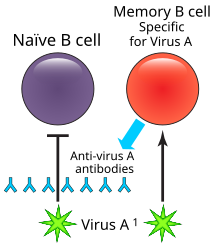
Back خلية بي ذاكرة Arabic Memorijska B-ćelija BS Limfòcit B de memòria Catalan خانەی بیرخەرەوەی بی CKB Paměťové B lymfocyty Czech Gedächtniszelle German Células B de memoria Spanish Lymphocyte B à mémoire French Célula B de memoria Galician Sel B memori ID

In immunology, a memory B cell (MBC) is a type of B lymphocyte that forms part of the adaptive immune system. These cells develop within germinal centers of the secondary lymphoid organs. Memory B cells circulate in the blood stream in a quiescent state, sometimes for decades.[1] Their function is to memorize the characteristics of the antigen that activated their parent B cell during initial infection such that if the memory B cell later encounters the same antigen, it triggers an accelerated and robust secondary immune response.[2][3] Memory B cells have B cell receptors (BCRs) on their cell membrane, identical to the one on their parent cell, that allow them to recognize antigen and mount a specific antibody response.[4]
- ^ Crotty S, Felgner P, Davies H, Glidewell J, Villarreal L, Ahmed R (November 2003). "Cutting edge: long-term B cell memory in humans after smallpox vaccination". Journal of Immunology. 171 (10): 4969–4973. doi:10.4049/jimmunol.171.10.4969. PMID 14607890.
- ^ Weisel F, Shlomchik M (April 2017). "Memory B Cells of Mice and Humans". Annual Review of Immunology. 35 (1): 255–284. doi:10.1146/annurev-immunol-041015-055531. PMID 28142324.
- ^ Seifert M, Küppers R (December 2016). "Human memory B cells". Leukemia. 30 (12): 2283–2292. doi:10.1038/leu.2016.226. PMID 27499139. S2CID 28936531.
- ^ Kurosaki T, Kometani K, Ise W (March 2015). "Memory B cells". Nature Reviews. Immunology. 15 (3): 149–159. doi:10.1038/nri3802. PMID 25677494. S2CID 20825732.
© MMXXIII Rich X Search. We shall prevail. All rights reserved. Rich X Search